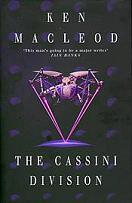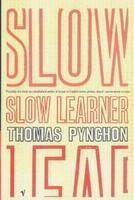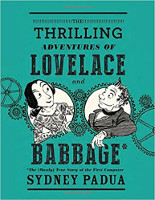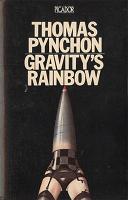 The Cassini Division is the 3rd book (out of 4) in Ken MacLeod's highly enjoyable Fall Revolution sequence; and just to be clear from the outset - this instalment, despite being a bit simpler in structure and scope, keeps up the high quality level in writing and reader enjoyment which we've come to appreciate from the first 2 books.
The Cassini Division is the 3rd book (out of 4) in Ken MacLeod's highly enjoyable Fall Revolution sequence; and just to be clear from the outset - this instalment, despite being a bit simpler in structure and scope, keeps up the high quality level in writing and reader enjoyment which we've come to appreciate from the first 2 books.
Notice to readers who are not readers (yet) of the earlier books in the series – this review will, by necessity, contain spoilers for the earlier books. Desist from reading on if this bothers you.
The story kicks off with a new protagonist: we encounter Ellen May Ngwethu on Earth, trying to convince Jonathan Wilde (the copy that came back from New Mars through the Wormhole) to provide some undisclosed information, to no avail. She then progresses on a backup plan by embarking on a trip through the wilds of 'non-co' London (canals, overgrown roads etc – Ken has loads of fun with old aka current-day place names and references) to seek out Islamabard Kingdom Malley – Sam to his friends - (yes, him of the Malley-Equations that allowed the construction of the wormhole). She manages to convince him to join her in the Cassini Division, the crack force of the Solar Union which keeps watch over the post-human civilization on Jupiter.
Her target? To find a way through the wormhole (colloquially known as the 'Malley Mile'), and check that David Reid has not re-started the 'fast folk' on New Mars and caused another Singularity which would endanger Earth.
Meanwhile the Jovians have reached 'consciousness' again (there's an ongoing thread of discussions concerning Artificial Intelligence, Simulated Awareness, everything except humans being 'flatlines' and emulations only etc that runs through the entire series); and, besides the ongoing viral attaks which they've been running ever since they colonized the planet, they are now broadcasting neighbourly and friendly messages all of a sudden.
The book fills in some parts of the history that the 2nd book with Jon Wilde's story skipped (as he was not conscious), especially the Schism in the Space Movement between the Earth Tendency and the Outwarders (motto: "if it isn't running programs and it isn't fusing atoms then it's just bending space") whom we encountered in their uploaded form in the Macros during The Stone Canal.
We also get some funky tech – on the one hand we have Earth and the Solar Union, which mainly run on Babbage machines, organic/chemical computers as well as means of communications due to the ongoing electro-magnetical viral attacks by the Jovians; on the other hand we have smart-matter clothes (and thus automatically space suits if needed) which the Cassini Division uses.
Ellen, as the main protagonist and view point through which the story is being told, is a fascinating figure; conflicted, damaged by her past, and bent on revenge. Her family got caught up in the conflict before the final run to space, and she fears her parents were 'conscripted' into the robot labour force around Jupiter. To her it is clear that every uploaded, simulated, or even downloaded into a new body conscience (Wilde!) is a flatline, and not alive. At some point during her development she was struck by the 'true knowledge' on how the world works, and this informs her opinions, actions, and (very rich if conflicted) internal life.
Most of the other characters pale into 1 or 2D insignificance besides her, which does not really affect the book, the story, or the readers enjoyment, though.
One thing that struck me was the way that a lot of the history prior to where we find the story, as well as other pre-story information is skilfully spread through and woven into the story, with no obvious infodumps to break the flow; something I very much appreciate.
The book itself is a bit simpler and more straight-forwards in terms of story arc than its two predecessors. There is a bit less depth, significantly less discussion on obscure political topics, but much more action; very much in end-of-trilogy style. I wonder what the final book will bring after this?
I did enjoy the book, even if I think that the first two were stronger, but this is still a strong 'must read' recommendation, for the book as well as for the series.
Title: The Cassini Division
Series: The Fall Revolution
Series Number: 3/4
Author: Ken McLeod
Reviewer: Markus
Reviewer URL: http://skating.thierstein.net
Publisher: Orbit
Publisher URL: http://www.orbitbooks.co.uk
Publication Date: 1999
Review Date: 100504
ISBN: 1857237307
Price: UKP 6.99
Pages: 240
Format: Paperback
Topic: SF
Topic: Space Opera
More Ken MacLeod













